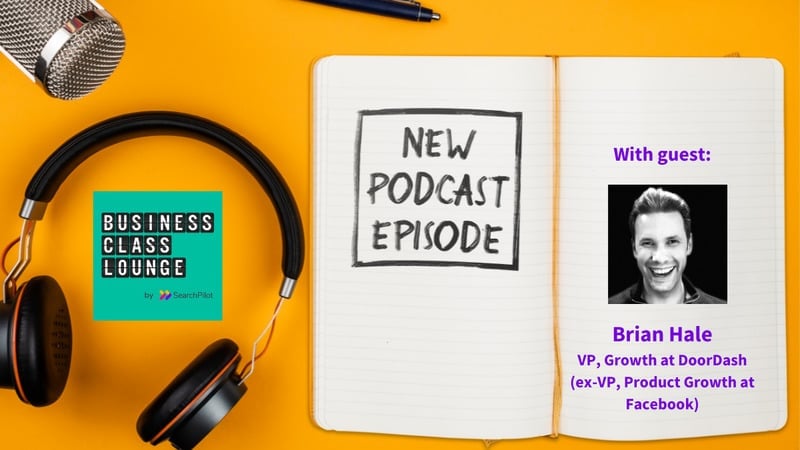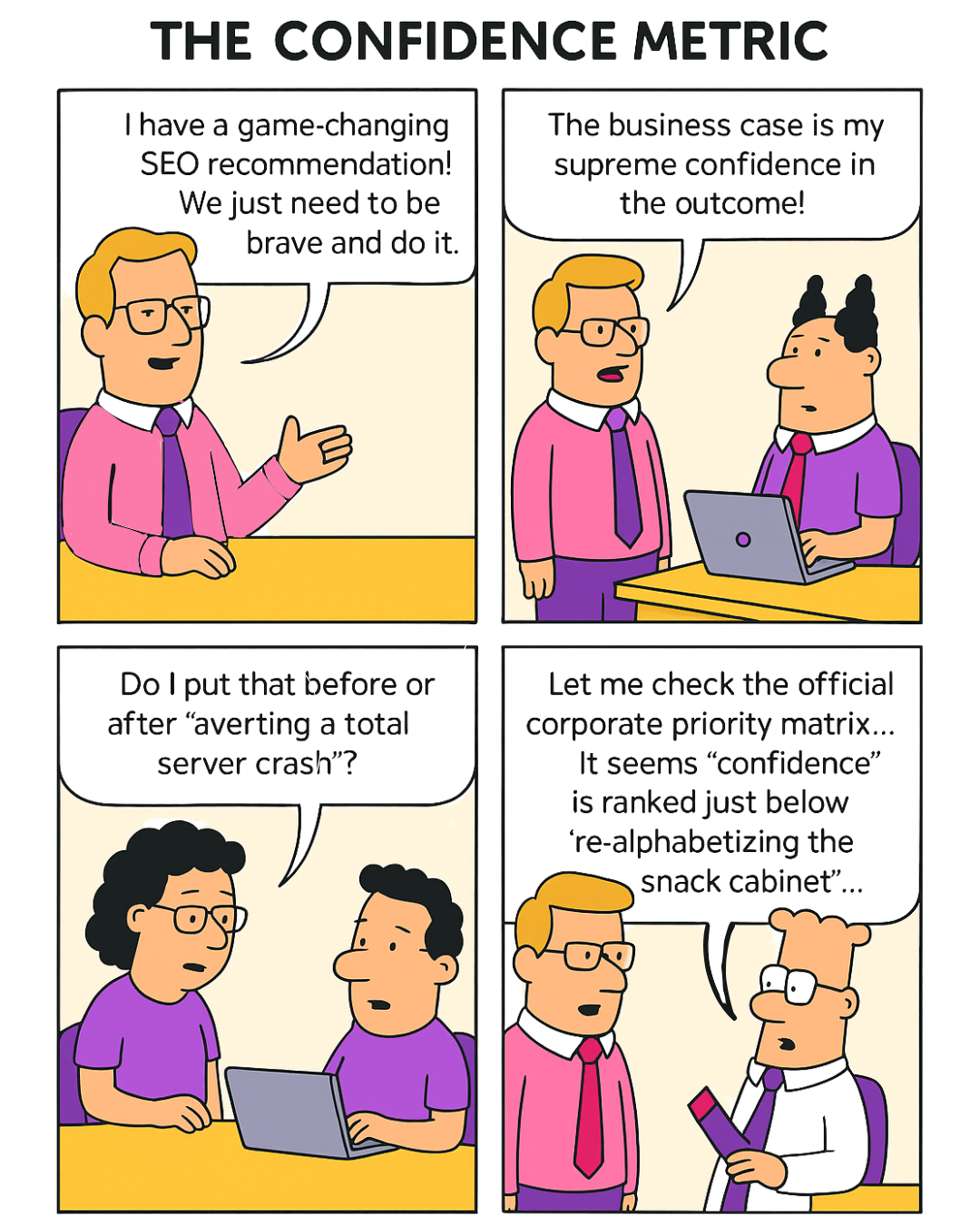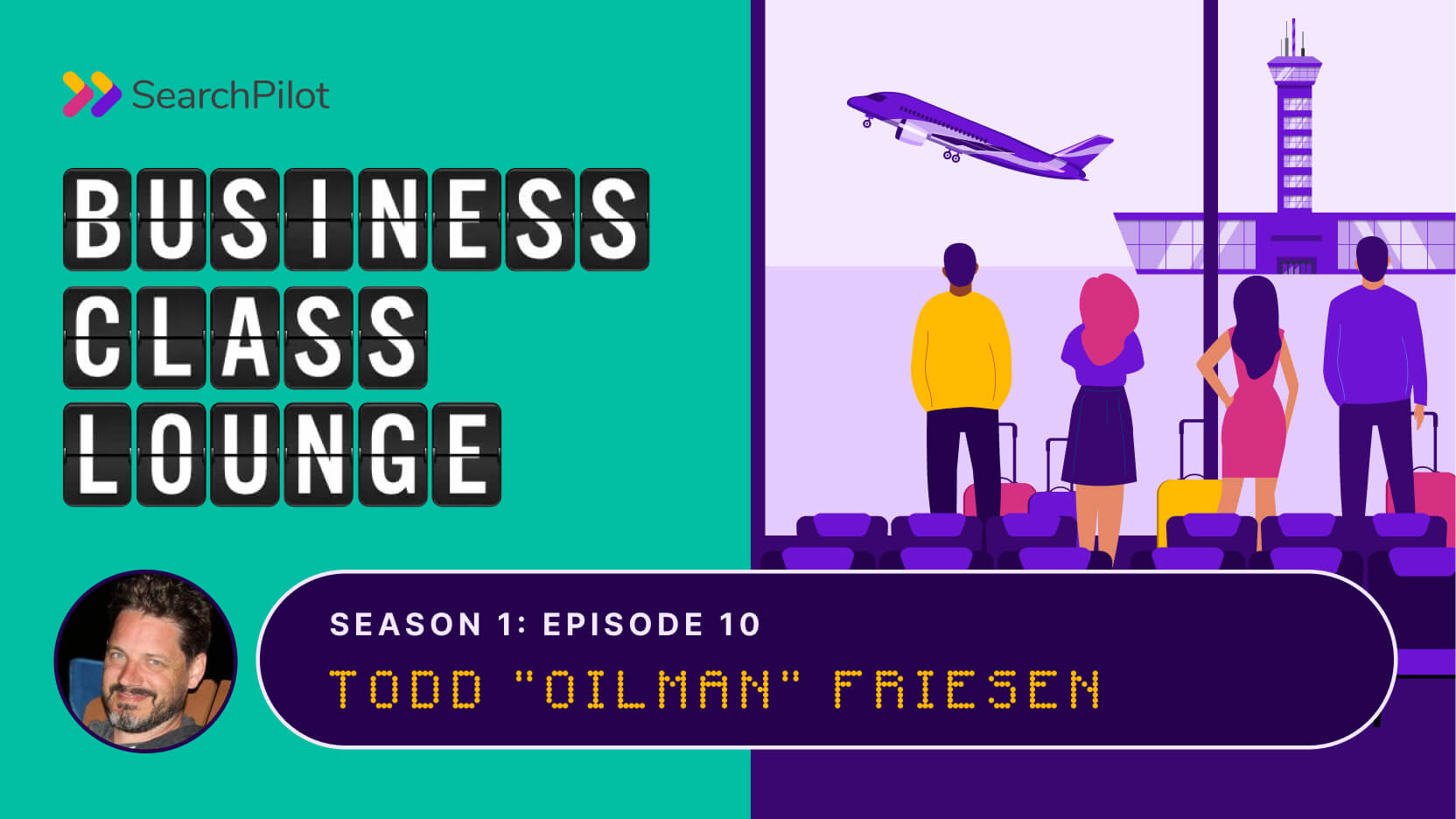My guest Brian Hale joins me for the final episode of Season 1 of the Business Class Lounge podcast. He is VP of Growth at DoorDash. We met over a decade ago when he was in the growth team of Facebook, and we got to work on some SEO initiatives. In the intervening decade, he rose through the ranks to become VP of Product Growth across Facebook before joining DoorDash.
He’s been responsible for as much growth and innovation as anyone I know, and his work has affected an incredible number of people. As you’ll see though, he’s also an empathetic and effective leader, and I enjoyed quizzing him about growth challenges. We covered a lot in this episode, from his career journey at Meta/Facebook to how he learned to balance being too nice with being too direct. He also shared some insights on leading growth teams and talked about that one time they had to grow ads revenue fast to prove Facebook was worth their IPO-ed value. I am sharing three thought streams from our discussion in the post here. You can check out the full episode now via the Apple player below or wherever you get your podcasts.
I’m interested in hearing about your career journey. What do you attribute your success at Facebook to and then this move to DoorDash? Is there a coherent story that hangs together when you look back on it?
Brian Hale (BH): I would say I am probably just very dogged about things. I just stick with things for a really long time, and that’s my personality. I like to think about long-term problems and things that drive compound interest and keep accumulating value over time. And you can’t really do that if you’re only in a role or in a job for a short period of time. So I get into things and then I just doggedly go after them, I suppose. When I was at Facebook, what was nice was that the company kept growing, so I was able to just grow with it and grow my career there. So it was a lovely place to be for quite a long time. Now, switching over to DoorDash, it’s like getting to hit reset on the game and going back to the earlier stages, which are a lot more fun than the very late stages of that game.
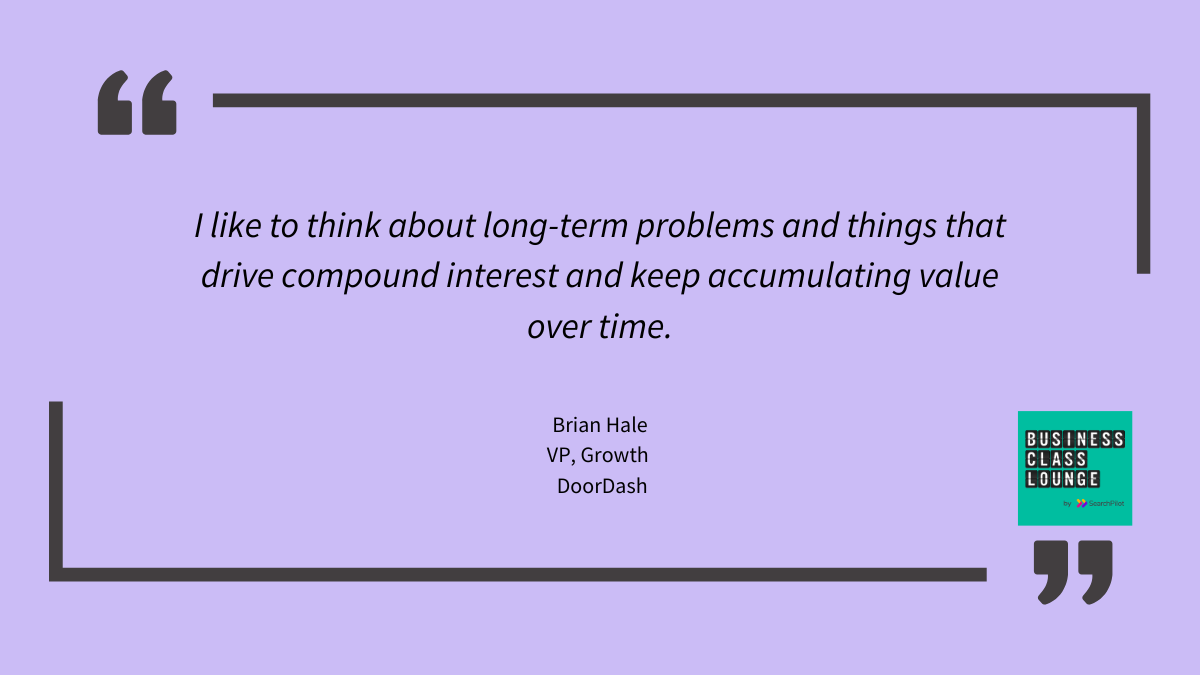
I think the only way you’re successful for a long period of time is that you find people who are super great and you invest in them. You keep helping them because anything you want to do that is meaningful requires a pretty big team.
The key is being in a place where there are those opportunities. If you’re in a place that’s growing and then you can continue to make sure you’re setting up the folks you’re investing in and the next layer down after that so you have folks to invite up if people leave.
It’s really important to have those conversations directly. So I have a very strong practice of just making sure to carve out time to talk about that. Otherwise, people are guessing what might be next. But usually, I think if you’re at a company that’s growing pretty fast and has a long runway and you’re good at what you do, and you’re in a spot where your manager and their manager also know about you and know about your work, then you’re in a really great spot.
I think actually people make the mistake of hopping around when they’re in that situation or thinking they need to. Now, it’s totally different if you’re in a situation where the company isn’t growing, the prospects aren’t very good, or if you know your manager and you aren’t on the same page about stuff, or you know you are, but their manager isn’t.
These are the key things for career growth: being somewhere that’s growing and having your manager and your manager’s manager on the same page that you’re someone they want to invest in.
If that’s all clear, then you’re way better off being patient and letting this notion of cumulative advantage accrue to you because over time you start to know how the company ticks. You start to know how everything works. You become more valuable. I actually think there’s a huge switching cost. I took it for granted but switching recently, which was almost a year and three quarters now, it takes a year to get ramped up with a whole new domain and a whole new company. So if you’re switching every year, then you’re just doing startup costs over and over again.
What have you taken from your previous managers that you went on to use in your management style?
BH: What was great about most of the managers I’ve had is that, especially at Facebook, you take a strengths-based approach. Rather than focusing on the things you don’t do well, you focus on the things that you do well. Sometimes to reach the next level, you have to work on stuff that you don’t do well because you won’t be able to do the next level without that.
I remember getting this feedback once, “Brian, you’re too nice.” And maybe it’s okay because it’s a stereotype for being a Canadian. I was like, “ Yeah. I’m sorry I’m too nice.” But with this, I think the key was understanding what that feedback was. I had a great manager at Facebook who took it to the next level and really explained what that feedback meant, what the impacts were, what the effects were, what was not happening or what was happening because of that.
A lot of managers make the mistake of trying to make their people well-rounded or something; that’s not what you’re trying to do. You’re trying to get people who are really good at things and then put them in a position where what they’re really good at is really needed, and you match that up and they’ll do brilliantly like that. That’s like your job as a leader or manager. Your number one job is to put people in a spot where they can be awesome. And if they’re awesome, then the company benefits. And the whole team benefits. Sometimes there’s actually a thing that’s going to hold them back, and in that case, what’s not helpful, like the least helpful thing ever, is when you tell someone who’s really talented, “Oh, you lack executive presence.” This is like this bullshit thing people say about people who you know haven’t made it yet. And usually, there’s some othering happening with that feedback like, “Oh, you’re not what they expect of a leader with executive presence.”
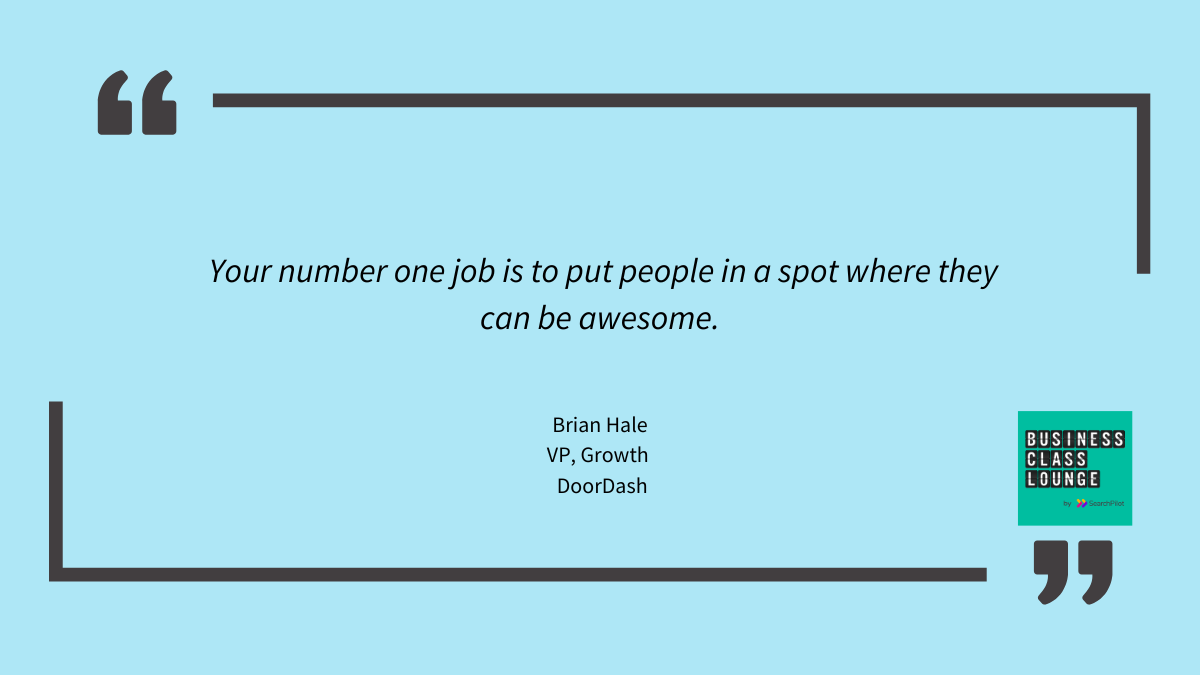
So what do I do with that feedback that I’m being too nice? To be not nice? But being nice is part of what got me here; it’s part of what makes people want to work with me. So it is a strength but then there are aspects of it that you can take to the next level and say, “Oh, what’s happening is, you’re right about your feedback, but they’re not hearing it because you’re padding it too much or you’re beating around the bush before you get to it.” You need to just get straight to the feedback and be really blunt about it because otherwise, they can’t hear you, or they’re not understanding that your feedback is essential or important because of the way it’s being delivered. And that was a revelation. And then my manager said something to the effect of, “I think you’re trying to be kind, but if you’re not giving them the feedback and then they’re failing because they’re not getting your feedback, then you are not being kind to them. You are being unkind to them because they’re failing, and you could have prevented that.” And that gave me permission to be really blunt. So my feedback became really specific about what it is, what the effect is, what is being missed, and why it matters.
I still had to work on it for a year. My boss then said, “Hey, as soon as I start getting feedback that you’re being too direct or you’re being too blunt then I’ll give you a promotion.” I pissed off one of the other executives and in my next 1-1 with my boss, he said, “This is great. You pissed off this other executive because you were so direct with your feedback. Your feedback was correct. They were wrong. They were a little upset about it. They heard you. They actually changed their plan because they heard you, they complained about how you said it, but now you can work on figuring out the right modulation, calibrating, and dialing that in.”
There’s always a spectrum. You have to tell people to make the other mistake, which is at the other end of the spectrum, when they’ve just made the mistake from this side of the spectrum. You won’t know where the middle is until you’ve gone too far. Mark Rabkin, a talented leader at Facebook, said that.
How did you and your team work together when things didn’t go so well?
BH: One of the best stories I can think of is the case of when Facebook IPO-ed and basically the stock just completely cratered because the story was that Facebook was never going to make any money. So Facebook is now public and this was not some hypothetical ‘we can just fix it eventually’ sort of situation: it’s both a major problem and very urgent. And I got asked, “Hey, can you do for advertisers what you were doing for consumers?” I didn’t know if it was going to work; maybe it was completely different. But we started an advertiser growth team and I got to work with this guy called Gokul Rajaram, who’s awesome and was leading ads at the time and we started a unit within the ads team. This model ended up being the model we used across the board for growth teams for everything, where it’s just embedded directly in the organization.
I had to figure out removing all the blockers and all the friction that was the same in this B2B world as it was in the B2C world. It was a huge success. The company’s mistake was basically assuming that there wasn’t a problem for advertisers. They all said, “Hey, people will just figure this out because it’s their job to figure out this kind of thing.” But we misunderstood that it’s a whole new kind of advertising that didn’t exist before. So we made it way easier for businesses to extend their reach and drive their business growth. That’s one of the big success stories.
Want more?
Head over to the Business Class Lounge to hear great conversations like this wherever you get your podcasts from: Apple, Spotify, Amazon, or YouTube or you can catch them all directly from the feed here.
I’d love to hear your thoughts on this ninth and final episode, email me at podcast@searchpilot.com or send me a message on LinkedIn. You can also find Brian on LinkedIn and check out the exciting work he’s doing at DoorDash.
*I’m preparing for the next season of The Business Class Lounge podcast, what do you want to learn more about and from who? Send me your suggestions at podcast@searchpilot.com. Thanks!
